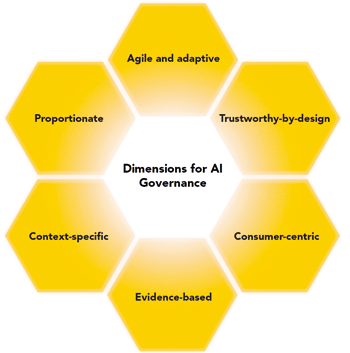Governing AI: Sri Lanka’s Next Digital Turning Point
View(s):Artificial Intelligence (AI) is no longer confined to Silicon Valley boardrooms or science fiction films. It is here, transforming healthcare systems, reshaping education, and redefining the way governments interact with citizens. Over 70 countries have already developed national AI policies. Sri Lanka cannot afford to sit on the sidelines. If harnessed responsibly, AI could help solve some of our deepest national challenges from agricultural inefficiency to educational inequality. If mismanaged, it could amplify bias, erode privacy, and strain our fragile institutions.
A New Frontier of Promise
Sri Lanka has long struggled to balance economic growth with social inclusion. AI, used wisely, offers a unique chance to shift this balance. In healthcare, AI-powered diagnostic tools could reduce waiting times in overstretched hospitals and bring early detection of illnesses to rural communities where doctors are scarce. In education, AI tutoring systems can personalise learning, supporting children who fall behind and empowering teachers with real-time insights. Agriculture the backbone of our economy could benefit from AI-driven climate forecasts, pest detection, and precision farming, helping farmers secure better yields despite unpredictable weather patterns.
Public administration too could be revolutionised. Imagine a government office where AI chatbots guide citizens through applications, reducing queues and opportunities for corruption. For a country struggling with public trust, transparent and efficient digital systems could be game-changers.
The Dangers We Must Confront
But optimism must be tempered with caution. AI comes with significant risks if governance does not keep pace. Algorithms trained on foreign or biased data could lead to discriminatory outcomes. For instance, a bank relying on AI to decide loans could inadvertently penalise rural applicants if the
training data reflects only urban income patterns.
Privacy is another urgent concern. Sri Lanka is only beginning to enforce its Personal Data Protection Act, and yet AI systems thrive on large amounts of personal information. Without strong safeguards, citizens’ health, financial, and even biometric data could be misused.
There are also environmental costs to consider. Training large AI models consumes vast amounts of energy and water a sobering thought for a country that already faces power shortages and struggles with climate resilience. Far from being a silver bullet, AI could add pressure if deployed irresponsibly.
Building the Foundations
Before Sri Lanka can leap into AI governance, it must get the basics right. Thriving AI ecosystems require robust digital infrastructure, reliable computing power, high-quality local datasets, and skilled human capital.
Our internet coverage remains patchy, with rural communities still struggling for reliable connections. Access to advanced computing resources, like high-performance servers and GPUs, is limited, leaving startups and universities at a disadvantage. Most critically, Sri Lanka lacks representative local datasets. Too often, algorithms are trained on foreign data, producing inaccurate or even harmful outcomes in local contexts. Collecting, digitising, and opening anonymised datasets from agriculture statistics to public health records should be a national priority.
Equally vital is investing in skills. AI is not just for computer scientists. Policymakers, teachers, farmers, and even schoolchildren need AI literacy to understand both its opportunities and risks. Without this, the digital divide will deepen.
Choosing the Right Governance Model
Around the world, countries are experimenting with four main approaches to AI governance: self-regulation, soft law, hard law, and regulatory sandboxes. For Sri Lanka, a hybrid approach makes sense.
Industry self-regulation can encourage companies and universities to adopt ethical practices, but this must be backed by clear principles. Soft law such as adopting international AI standards provides flexibility while avoiding overregulation. Regulatory sandboxes, already used in fintech, could allow safe experimentation in health and education. Hard law, such as a dedicated AI Act, may eventually be needed for high-risk areas like national security or biometric surveillance.
A Sri Lankan Way Forward
Sri Lanka should not simply copy-paste the European Union’s AI Act or Singapore’s digital playbook. Instead, governance must reflect our local realities. A practical roadmap could include:
- Launching a National AI Roadmap that sets clear priorities in health, education, and agriculture.
- Creating a Public AI Data Trust to digitise and share anonymised datasets responsibly.
- Establishing an AI Regulatory Sandbox in partnership with banks, hospitals, and universities.
- Strengthening the Data Protection Act to balance innovation with privacy.
- Expanding AI education
and skills training, from schools to universities to public servants.
The Global Dimension
AI is inherently global. No single country can solve the risks of biased algorithms, disinformation, or supply chain dependencies on its own. For Sri Lanka, regional collaboration with South Asia,
and active participation in international forums, will be critical.
A Choice for the Future
At its core, AI is not just about technology it is about trust. Citizens must believe that AI serves the public good, not narrow interests. If Sri Lanka can build transparent, inclusive, and sustainable governance, AI could help us leapfrog development hurdles and position the country as a responsible digital leader in the region.
The choice before us is clear: either let AI shape us without preparation, or shape it with foresight and responsibility. For a country in search of economic renewal, the responsible path could define Sri Lanka’s next digital turning point.
HitAd.lk is the best and biggest mobile phone market in Sri Lanka, and we guarantee you will find what you need here from our extensive listing of mobile phones for sale in Sri Lanka. Whether it’s a budget-priced smartphone for communication, or higher end features with advanced connectivity, there are many different options from which to choose from on our site!


